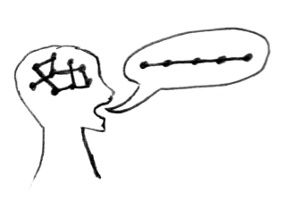Linearisation

A year ago, I wrote Keeping a NOTES file, about the benefits of keeping a plain text file for you to dump words into when you're working on a project. I've found it a great way to add a bit more structure and persistance to the otherwise freewheeling thought process that goes with designing something. There's an underlying principle I've since become more familiar with that I think is worth exploring.
I've said before that I think of the brain as an association machine, and inherent in that idea is that it's good at certain kinds of things, but pathologically bad at others. The fuzzy and haphazard way that we walk through ideas associatively is great for creativity, for finding connnections between unrelated things and quickly searching for patterns. It is, on the other hand, complete rubbish at thinking exhaustively or systematically, and constantly gets stuck in self-perpetuating loops and spirals.
But whether by crafty evolution or just pure luck, our communication does not seem to have that problem. When you describe a dream, the messy and incoherent associations fall apart in your head as you try to turn them into words. When you try to explain an idea that you don't really understand, you suddenly realise the gaps in what you know. The process of communicating somehow causes you to linearise these associations, to marshall them into a form that is stable enough to survive transit into someone else's brain. I believe that process is unique – or, at least, I have not found a way to replicate the relative orderliness of communicative thinking other than by communicating.
What that means is that there are lots of tricks besides NOTES files that are worth engaging in as a form of mental linearisation. The symbolic manipulation of mathematics (and programming, for that matter) is a good example: you can think some crazy idea, but when you start trying to put the symbols down you realise it doesn't make any sense, or that it works in a slightly different way to what you expect. I've found literate programming to be particularly good in this regard; it's a kind of hybrid between a NOTES file and a symbolic representation.
One thing that has been surprisingly helpful is to just talk out loud. I'm not sure why it's socially discouraged, because as far as I can tell it is genuinely useful as a thinking tool. I've found both puzzle games and mathematical problems much easier when I describe the problem and my steps out loud as I'm working; that little bit of order is just enough to keep everything organised in my head while I search for the solution.
Of course, in a sense these posts are a way to linearise my thoughts and ideas. Subjectively, I feel like they've brought a lot more clarity to the way I think. Being able to linearise has been helpful in a lot of different situations, up to and including thinking about linearisation itself.